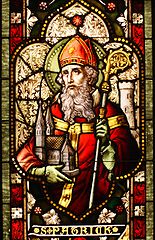
The Life And Writings Of Saint Patrick -Saint Patrick
III.—THE IRISH COLLECTION OF CANONS
The Irish Collection, to which we need not further refer here, is a compilation of much later date, but full of interest from the light it throws on the history of the early Irish Church. Its most important Canons are those taken from the ‘Synod of Patricius, Auxilius and Iserninus,’ and also from the Book of Armagh, as has been already explained. But it contains several other Canons of great interest, which it attributes, and no doubt with justice, to St. Patrick himself.
For instance, we have the following Canons attributed to Patrick in the most formal way in the Collection.
Patrick the Bishop saith—‘He who sins in Orders (sub gradu) ought to be excommunicated, because great is the dignity of this name (of priest); yet he can redeem his soul by penance; but to return to his former grade is difficult. I know not, however, but God knows (how difficult it is).’ This Canon expresses the whole tenor of Patrick’s dealings with erring ecclesiastics. He left them sometimes, after an excommunication more or less formal, to be punished as it might please God, but he did not exclude them utterly from the ministry or the communion of the faithful.
Again Patrick saith—‘If any difficult questions should arise in this Island let them be referred to the Apostolic See.’ This is a mere summary of the Canon contained in the Book of Armagh, brief but accurate.
Then we have attributed to Patrick a noble exposition in a few words of the duties of ecclesiastical judges. Regarding the judges of the Church, what manner of men they ought to be, Patrick saith—‘The judges of the Church must have the fear of God, not of men, because the fear of God is the beginning of wisdom. The judges of the Church should have the wisdom of God, not worldly wisdom, because the wisdom of this world is folly in the sight of God. The judges of the Church must not accept gifts, because gifts blind the eyes of wise men and pervert the words of the just. In their judgments there must be no accepting of persons, because there is no such accepting of persons before God. They must have before their minds, not the cunning of secular wisdom, but the precedents of the Divine law. The servants of God should be wise but not astute. They should not be quick to judge before they know the nature of the evil, for the Scripture saith, do not judge in haste. The judges of the Church should be sparing in their words; above all things, they should never utter a word that is false, for falsehood is in them a grave crime, but they must judge in all things justly, because as they judge others, by the same standard shall they themselves be judged.’ It is obvious that noble principles like these, solemnly inculcated by the great Teacher of the Irish tribes, must have exercised a very great influence in teaching, not only the ecclesiastical judges, but all classes of the people, respect for law and for the rights of others, which is, indeed, the foundation of all true religion and civilization, and was, above all, needful in a country like Ireland, where the want of a strong central government offered a strong temptation to rapacity and crime.
He also forbade the secular tribunals to encroach on the jurisdiction of the Church (judicia ecclesiæ). Then, going still higher, he lays down the following admirable maxims for the guidance of the petty kings.
Patricius saith—‘The duty of a just king is to judge no one unjustly; to be the defender of the widow, the orphan, and the stranger; to punish thefts and adulteries; not to encourage unchaste buffoons; not to exalt wicked men, but root out the impious from the land; to put to death parricides and perjurers; to protect the churches and give alms to the poor; to select wise ministers and prudent counsellors; to give no sanction to druids or pythonesses or augurers; to defend his country in strength and justice against all adversaries; at all times to put his confidence in God, neither puffed up by prosperity nor cast down by adversity; to profess the Catholic faith in God; to restrain his sons from evil deeds; to give stated times to prayer, and not waste it in unseasonable banquets.’ This, he says, is the justice of a king which secures peace to the people, protection to the nation, the defence of the poor, the care of the infirm, the happiness of the community, with all other temporal blessings which they can desire, including mildness of climate, calmness on sea, fruitfulness of the earth, comfort for the poor, wealth for children to inherit, abundant crops, fruitful trees, and hopes of future happiness.
Those noble principles, so eloquently expounded in the Canon, were inculcated by Patrick in his preaching, formulated in his laws, and enforced by all the weight of his authority. It is no wonder they were so potent in creating that young Christian Ireland which became the home of so many saints and scholars and the admiration of all Christian Europe.

 Keep Site Running
Keep Site Running